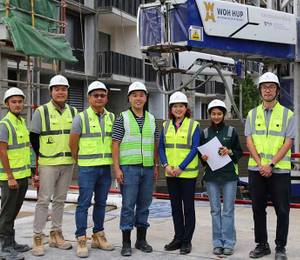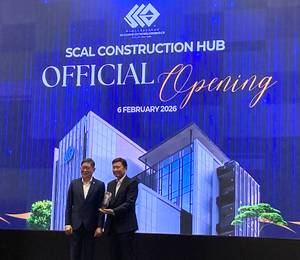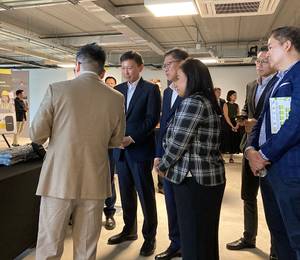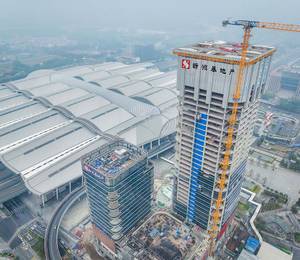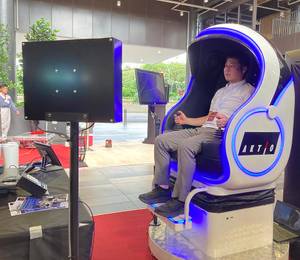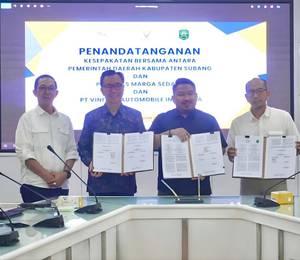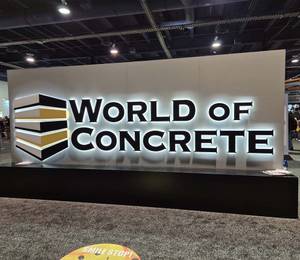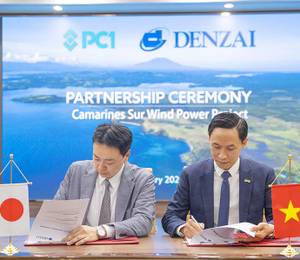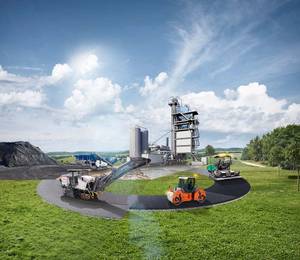JP Nelson, a leading equipment and machinery solutions provider based in Singapore, has officially inaugurated its new office and launched its battery energy storage system (BESS). A special event to celebrate this milestone was held on 30 July 2024, attended by various contractors, suppliers and manufacturers.
The new BESS will serve as a sustainable alternative to diesel-powered generators, shared JP Nelson. At the same time, the company’s new office building has been designed with energy-efficient features and eco-friendly practices in mind. These green initiatives are aimed at reducing carbon emissions and enhancing energy efficiency in Singapore’s construction sector.
“This milestone signifies our commitment to driving positive change through innovation and sustainable practices,” said Nelson Lim, executive chairman of JP Nelson. “With initiatives like BESS integration and transitioning to electric vehicles, JP Nelson is setting new benchmarks in the construction industry.”
Speaking at the event, Mr Lim revealed JP Nelson’s future direction and goals, which are aligned with Singapore’s Green Plan 2030. He said the company plans to bring more electric-powered machines and equipment to the local market, helping to reshape Singapore’s construction landscape towards sustainability.
“I am heartened to learn that JP Nelson plans to electrify about 30-40% of your company’s local equipment in the coming two years,” said Tan Kiat How, Senior Minister of State for Ministry of Digital Development and Information & Ministry of National Development, who spoke at the event as the guest of honour.
“Moving towards electrification can reduce the carbon emissions from such construction equipment by about 50%, compared to conventional diesel equivalents,” noted Mr Tan, and added that “electrified construction equipment also allow for a more pleasant environment for workers and surrounding stakeholders, as they are cleaner and quieter. With automation and remote operation, electrified equipment also have the potential of creating a safer environment for workers.”
Mr Tan further encouraged all construction industry stakeholders to support Singapore’s efforts in raising site productivity and building a greener work environment. “After the severe disruptions caused by the pandemic, the construction industry is now undergoing exciting transformations to better position itself for the future. Global trends such as technological advancements and a heightened focus on sustainability are driving these changes.”
BESS: eco-friendly, versatile yet cost-efficient
JP Nelson’s new BESS, comprising the BESS 500 and BESS 300, come with a rated power of 500 kW and 300 kW respectively. These models are CE/UL/IEC certified, and are available with a grid, hybrid or synchronise operation system.
Delivering zero emissions and zero noise pollution, both models provide high energy efficiency and economical operation costs. Their usage can be monitored remotely, making it easier for the users.
The BESS solution offers many advantages, explained JP Nelson. It is environment-friendly, reducing reliance on fossil fuels and greenhouse gas emissions. It can be used in a wide range of applications, from residential to industrial projects. It also enhances the reliability and utilisation of renewable energy sources. Plus, it has economic benefits, with potential for cost savings through peak shaving and energy arbitrage.
For Singapore in particular, green energy solutions like BESS are very important to help combat climate change. “Our sea level could rise from 0.2 to 1.15 m, with S$100 billion needed to tackle rising sea level,” noted JP Nelson, citing a government report on climate change.
“We will also have a warmer temperature, which could go up by up to 5°C (to between 34°C and 37°C), rainfall increase by 500 ml, and dry season for one month every 10 months (as opposed to every few years).”
JP Nelson further pointed out that given the increase in Singapore’s carbon tax over the coming years, the BESS will bring an even greater benefit to users in the local market.
“Currently our carbon tax rate is set at S$25/tCO2 in 2024, and by 2030 it will go up to S$50-80/tCO2. This higher carbon tax means an increase in fuel price,” highlighted JP Nelson. “Additionally, the phasing out of ICE (internal combustion engine) by 2040 will make BESS a more attractive option and an ideal choice for the construction industry.”
Various machines for Singapore
Besides its new BESS, JP Nelson also offers a number of electric machines for the Singapore market. Among them is an electric wheel loader with a battery capacity of 282/350 kWh. The machine has a rated load capacity of 5,800 kg, bucket capacity of 2.5 to 4.5 cu m, and two-speed electric drive system.
Fitted with a spacious cabin, this electric wheel loader features a gradient angle of 30°, digging force of ≥170 kN, and travelling motor power of 120/240 kW. The machine can operate for up to 12 working hours.
Other electric models include the Zoomlion ZA20JERT electric boom lift with a working height of 22 m, and the Zoomlion ZCC850V-1EV electric crawler crane. The ZCC850V-1EV is able to run for about eight hours or more, with zero emissions and a low noise level, resulting in a cleaner work environment and greater comfort for the operator.
Another highlight is the Zoomlion ZT72J-V, dubbed the world’s tallest boom lift. It has a working height of up to 72.3 m, which is equivalent to about 27-storey-high HDB flats (Singapore’s public housing), and a horizontal outreach of up to 32 m. The machine’s X outriggers provide a larger working envelope, higher off-road ability and better stability.
JP Nelson also offers the Zoomlion ZAT1200V all-terrain crane, a 120-t-capacity, four-axle model equipped with a seven-section boom that can extend up to 66 m, and a 17.5-m fixed jib. This crane has versatile driving modes, such as all-wheel steering and crab steering.
In addition, the Zoomlion ZCT1000V is a 100-t-capacity telescopic crawler crane with a boom length of 50 m and jib length of 16 m. This model is easy to transport, requiring only one lowbed and one trailer.
Note: This story has also been published in the Sept/Oct 2024 issue of SEAC (with more images). Click here to read it online or here to download the PDF file (pages 42-45).

